 Evolutionary Causation: Biological and Philosophical Reflections
Evolutionary Causation: Biological and Philosophical Reflections
The MIT Press, 2019
Tobias Uller, Kevin N Laland
A comprehensive treatment of the concept of causation in evolutionary biology that makes clear its central role in both historical and contemporary debates.
Most scientific explanations are causal. This is certainly the case in evolutionary biology, which seeks to explain the diversity of life and the adaptive fit between organisms and their surroundings. The nature of causation in evolutionary biology, however, is contentious. How causation is understood shapes the structure of evolutionary theory, and historical and contemporary debates in evolutionary biology have revolved around the nature of causation. Despite its centrality, and differing views on the subject, the major conceptual issues regarding the nature of causation in evolutionary biology are rarely addressed. This volume fills the gap, bringing together biologists and philosophers to offer a comprehensive, interdisciplinary treatment of evolutionary causation.
Contributors first address biological motivations for rethinking evolutionary causation, considering the ways in which development, extra-genetic inheritance, and niche construction challenge notions of cause and process in evolution, and describing how alternative representations of evolutionary causation can shed light on a range of evolutionary problems. Contributors then analyze evolutionary causation from a philosophical perspective, considering such topics as causal entanglement, the commingling of organism and environment, and the relationship between causation and information.
Visit the book’s website for more information.
 Darwin’s Unfinished Symphony: How Culture Made the Human Mind
Darwin’s Unfinished Symphony: How Culture Made the Human Mind
Princeton University Press, 2017
Kevin N Laland
Humans possess an extraordinary capacity for cultural production, from the arts and language to science and technology. How did the human mind—and the uniquely human ability to devise and transmit culture—evolve from its roots in animal behaviour? Darwin’s Unfinished Symphony presents a captivating new theory of human cognitive evolution. In his book, Kevin Laland reveals how culture is not just the magnificent end product of an evolutionary process that produced a species unlike all others—it is also the key driving force behind that process.
Darwin’s Unfinished Symphony is the winner of the 2017 British Psychological Society (BPS) Book Award for Academic Monograph and the 2018 Association of American Publishers PROSE Award for Biological Science. It was also named as one of Forbes.com’s 10 Best Biology Books of 2017 as chosen by GrrlScientist, and selected for Askblog’s Books of the Year 2017.
Visit the book’s website for more information.
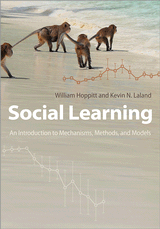 Social Learning: An Introduction to Mechanisms, Methods and Models
Social Learning: An Introduction to Mechanisms, Methods and Models
Princeton University Press, 2013
William Hoppitt & Kevin N Laland
Many animals, including humans, acquire valuable skills and knowledge by copying others. Scientists refer to this as social learning. It is one of the most exciting and rapidly developing areas of behavioral research and sits at the interface of many academic disciplines, including biology, experimental psychology, economics, and cognitive neuroscience. Social Learning provides a comprehensive, practical guide to the research methods of this important emerging field. William Hoppitt and Kevin Laland define the mechanisms thought to underlie social learning and demonstrate how to distinguish them experimentally in the laboratory. They present techniques for detecting and quantifying social learning in nature, including statistical modeling of the spatial distribution of behavior traits. They also describe the latest theory and empirical findings on social learning strategies, and introduce readers to mathematical methods and models used in the study of cultural evolution.
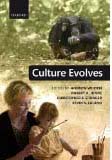 Culture Evolves
Culture Evolves
Oxford University Press, 2012
Andrew Whiten, Robert Hinde, Christopher Stringer & Kevin N Laland, Editors
Culture – broadly defined as all we learn from others that endures for long enough to generate customs and traditions – shapes vast swathes of our lives and has allowed the human species to dominate the planet in an evolutionarily unique way. Culture and cultural evolution are uniquely significant phenomena in evolutionary biology: they are products of biological evolution, yet they supplement genetic transmission with social transmission, thus achieving a certain independence from natural selection. However, cultural evolution nevertheless expresses key Darwinian processes itself and also interacts with genetic evolution. Just how culture fits into the grander framework of evolution is a big issue though, yet one that has received relatively little scientific attention compared to, for example, genetic evolution. Our ‘capacity for culture’ appears so distinctive among animals that it is often thought to separate we cultural beings from the rest of nature and the Darwinian forces that shape it. ‘Culture Evolves’ presents a different view arising from the recent discoveries of a diverse range of disciplines, that focus on evolutionary continuities. First, recent studies reveal that learning from others and the transmission of traditions are more widespread and significant across the animal kingdom than earlier recognized, helping us understand the evolutionary roots of culture. Second, archaeological discoveries have pushed back the origins of human culture to much more ancient times than traditionally thought. These developments together suggest important continuities between animal and human culture. A third new array of discoveries concerns the later diversification of human cultures, where the operations of Darwinian-like, cultural evolutionary processes are increasingly identified. Finally, surprising discoveries have been made about the imprint of cultural evolution in children’s predisposition to acquire culture. The result of a major interdisciplinary meeting held by the Royal Society and the British Academy, this book presents the work of leading experts from the fields of ethology, behavioural ecology, primatology, comparative psychology, archaeology, anthropology, evolutionary biology and developmental psychology.
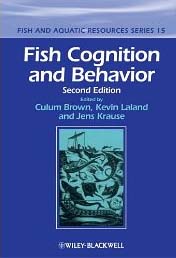 Fish Cognition and Behaviour, Second Edition
Fish Cognition and Behaviour, Second Edition
Wiley-Blackwell, 2011
Culum Brown, Kevin N Laland & Jen Krause, Editors
The study of animal cognition has until recently been largely confined to birds and mammals; a historical bias which has led to the belief that learning plays little or no part in the development of behavior in fishes and reptiles. Research in recent decades has begun to redress this misconception and it is now recognized that fishes exhibit a rich array of sophisticated behavior with impressive learning capabilities entirely comparable with those of mammals and other terrestrial animals. Building on the very well–received First Edition, and covering all major areas of fish learning, all chapters in this brand new edition of Fish Cognition and Behavior have been revised and updated by an internationally recognized team of contributing authors, with the addition of three brand new chapters, covering personality traits and behavior, lateralization of cognitive functions in fish, and cognition and welfare.
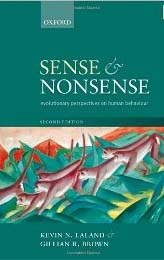 Sense and Nonsense, Second Edition
Sense and Nonsense, Second Edition
Oxford University Press, 2011
Kevin N Laland & Gillian Brown
Evolutionary theory is one of the most wide-ranging and inspiring scientific ideas and it offers a battery of methods that can be used in interpret human behaviour. However, researchers disagree about the best ways to use evolution to explore humanity, and a number of schools have emerged. Sense and Nonsense, second edition provides an introduction to the ideas, methods, and findings of five such schools, namely sociobiology, human behavioural ecology, evolutionary psychology, cultural evolution, and gene-culture co-evolution. In this revised and updated edition of their successful monograph, Laland and Brown provide a balanced and rigorous analysis that scrutinizes both the evolutionary arguments and the allegations of the critics, carefully guiding the reader through the mire of confusing terminology, claim and counter-claim, and polemical statements. Having completed this book, the reader will feel better placed to assess the legitimacy of claims made about human behaviour under the name of evolution, and to make judgments as to what is sense and what is nonsense.
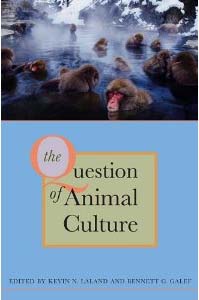 The Question of Animal Culture
The Question of Animal Culture
Harvard University Press, 2009
Kevin N Laland & Bennett Galef, Editors
Fifty years ago, a troop of Japanese macaques was observed washing sandy sweet potatoes in a stream, sending ripples through the fields of ethology, comparative psychology, and cultural anthropology. The issue of animal culture has been hotly debated ever since. Now Kevin Laland and Bennett Galef have gathered key voices in the often rancorous debate to summarize the views along the continuum from ‘Culture? Of course!’ to ‘Culture? Of course not!’ The result is essential reading for anyone interested in the validity of animal culture, and what it might say about our own.
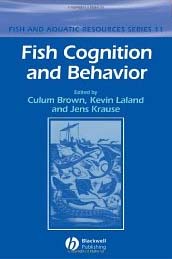 Fish Cognition and Behaviour
Fish Cognition and Behaviour
Wiley-Blackwell, 2006
Culum Brown, Kevin N Laland & Jen Krause, Editors
The study of animal cognition has been largely confined to birds and mammals; a historical bias which has led to the belief that learning plays little or no part in the development of behaviour in fishes and reptiles. Research in recent decades has begun to redress this misconception and it is now recognised that fishes exhibit a rich array of sophisticated behaviour with impressive learning capabilities entirely comparable with those of mammals and other terrestrial animals. In this fascinating book an international team of experts have been brought together to explore all major areas of fish learning, including: foraging skills; predator recognition; social organisation and learning; welfare and pain.
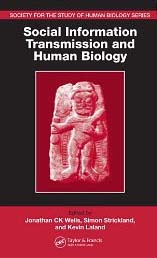 Social Information Transmission and Human Biology
Social Information Transmission and Human Biology
CRC Press, 2006
Jonathan Wells, Simon Strickland & Kevin N Laland, Editors
Recent research has emphasized that socially transmitted information may affect both the gene pool and the phenotypes of individuals and populations, and that an improved understanding of evolutionary issues is beneficial to those working towards the improvement of human health. Equally, an improved awareness of how human behavior influences health and reproductive fitness is starting to shed new light on the processes that shape the evolution of human behavior and the human mind.
Focusing directly on these emerging trends, Social Information Transmission and Human Biology bridges the gap between primarily theoretical work undertaken by those with evolutionary interests and biomedical work undertaken by those dealing with practical issues in human health and demographics. Incorporating papers from a symposium organized under the auspices of the UK Society for the Study of Human Biology, this volume merges the perspectives of internationally renowned evolutionary and theoretical biologists, zoologists, anthropologists, archaeologists, psychologists, and medical researchers whose work is linked by common themes addressing how information is transmitted socially and how its transmission influences both immediate and evolutionary biological outcomes. To illustrate these themes, the chapters draw on models and data ranging from observations on chimpanzee populations in the wild and on the human archaeological record, to studies of contemporary humans in both developing and industrialized countries. Taking a broad approach, many of the chapters address areas of behavior that are familiar to scientists in particular fields, but do so using a variety of cross-disciplinary perspectives, which will prove stimulating for researchers in a range of academic subject areas, while helping to facilitate closer collaboration between biological and social scientists.
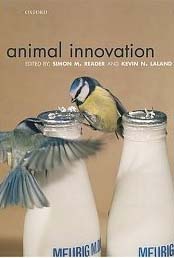 Animal Innovation
Animal Innovation
Oxford University Press, 2003
Simon M Reader & Kevin N Laland, Editors
In 1953 a young female Japanese macaque called Imo began washing sweet potatoes before eating them, presumably to remove dirt and sand grains. Soon other monkeys had adopted this behaviour, and potato washing gradually spread throughout the troop. When, three years after her first invention, Imo devised a second novel foraging behaviour, that of separating wheat from sand by throwing mixed handfuls into water and scooping out the floating grains, she was almost instantly heralded around the world as a ‘monkey genius’. Imo is probably the most celebrated of animal innovators. In fact, many animals will invent new behaviour patterns, adjust established behaviours to a novel context, or respond to stresses in an appropriate and novel manner. Innovation is an important component of behavioural flexibility, vital to the survival of individuals in species with generalist or opportunistic lifestyles, and potentially of critical importance to those endangered or threatened species forced to adjust to changed or impoverished environments. Innovation may also have played a central role in avian and primate brain evolution. Yet until recently animal innovation has been subject to almost complete neglect by behavioural biologists, psychologists, social learning researchers, and conservation-minded biologists. This collection of stimulating and readable articles by leading scientific authorities is the first ever book on ‘animal innovation’, designed to put the topic of animal innovation on the map and heighten awareness of this developing field.
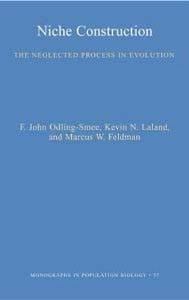 Niche Construction: The Neglected Process in Evolution
Niche Construction: The Neglected Process in Evolution
Princeton University Press, 2003
F John Odling-Smee, Kevin N Laland & Marcus W Feldman
The seemingly innocent observation that the activities of organisms bring about changes in environments is so obvious that it seems an unlikely focus for a new line of thinking about evolution. Yet niche construction – as this process of organism-driven environmental modification is known – has hidden complexities. By transforming biotic and abiotic sources of natural selection in external environments, niche construction generates feedback in evolution on a scale hitherto underestimated – and in a manner that transforms the evolutionary dynamic. It also plays a critical role in ecology, supporting ecosystem engineering and influencing the flow of energy and nutrients through ecosystems. Despite this, niche construction has been given short shrift in theoretical biology, in part because it cannot be fully understood within the framework of standard evolutionary theory. Wedding evolution and ecology, this book extends evolutionary theory by formally including niche construction and ecological inheritance as additional evolutionary processes. The authors support their historic move with empirical data, theoretical population genetics, and conceptual models. They also describe new research methods capable of testing the theory. They demonstrate how their theory can resolve long-standing problems in ecology, particularly by advancing the sorely needed synthesis of ecology and evolution, and how it offers an evolutionary basis for the human sciences.
 Sense and Nonsense
Sense and Nonsense
Oxford University Press, 2003
Kevin N Laland & Gillian Brown
Evolutionary theory is one of the most wide-ranging and inspiring scientific ideas and it offers a battery of methods that can be used in interpret human behaviour. However, researchers disagree about the best ways to use evolution to explore humanity, and a number of schools have emerged. Sense and Nonsense, provides an introduction to the ideas, methods, and findings of five such schools, namely sociobiology, human behavioural ecology, evolutionary psychology, memetmics, and gene-culture co-evolution.
